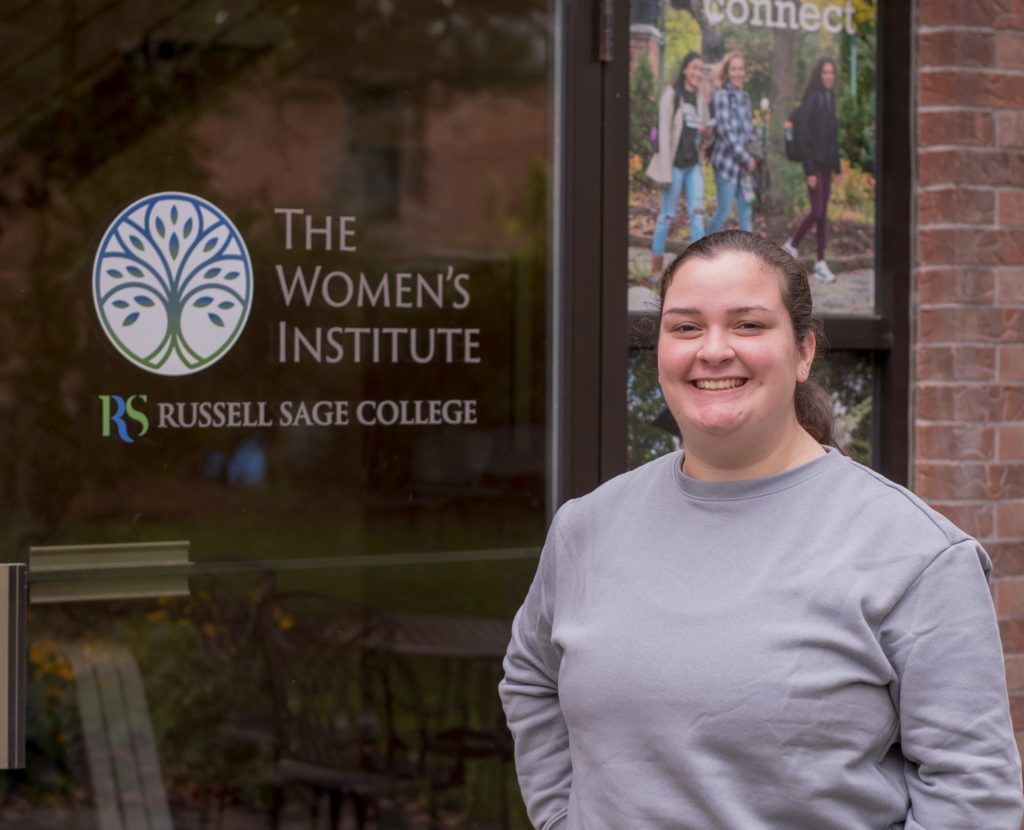Learn more about the classes that are inspiring Russell Sage College students.

Jenny Bryan ’25 admits that she registered for Sociology 209: Gender, Feminism and Society because she was required to take a Sociology class for her Nursing bachelor’s degree and this one fit her schedule.
“It was so awkward,” says Jenny of the first class meeting. “I was the only first-year student. We went around the room saying why we were taking the class. I just needed a Soc credit.”
The course, taught by Michelle Napierski-Prancl, Ph.D., examines how categories of gender and sexuality are influenced by social expectations.
“It became so interesting to me,” continues Jenny. “I never really paid attention to feminism and women’s history. I was uneducated, actually. I felt like, ‘The past is the past.’ Then I realized, we are still fighting for so many things.”
“Now I’m completing a Women’s Studies minor and tying it in with Nursing,” she says. “I’m tying it in with women’s health, and how women’s health has not been prioritized.”
Jenny also started researching women’s equality on her own, not just for class assignments.
“I read every author the Women’s Institute at Russell Sage College has brought in,” she says.
For her Women’s Studies capstone project, Jenny is creating a list of essential books aspiring health care professionals should read.
“I’m writing a report and I’m displaying the books in the Troy campus library in April, with blurbs about why you should read these,” she says.
The titles include Vagina Obscura: An Anatomical Voyage by Rachel Gross, whom the Women’s Institute hosted in 2022, Radium Girls by Kate Moore, who is visiting in March 2023 and Beauty Sick: How the Cultural Obsession with Appearance Hurts Girls and Women by Renee Engeln, who visited Sage in 2019.
Others are Bodies of Knowledge: Sexuality, Reproduction, and Women’s Health in the Second Wave by Wendy Kline; The Immortal Life of Henrietta Lacks by Rebecca Skloot; Killing the Black Body: Race, Reproduction, and the Meaning of Liberty by Dorothy Roberts; and Invisible Women: Data Bias in a World Designed for Men by Caroline Criado Perez.
“My friends are studying Nursing, Nutrition, Psychology and Occupational Therapy. We’re all health care majors and we should be educated about these topics.”
Professor Napierski-Prancl noticed how Jenny’s interest grew during her semester in Gender, Feminism and Society, and encouraged her to join the Women’s Institute as a student-ambassador.
Institute ambassadors lead service projects and activities that bring attention to feminist issues, and preserve Russell Sage College’s century-long dedication to women’s equality.
“The women’s history here is so rich, and it’s important that we keep that tradition going,” says Jenny.
Jenny now concedes that the class she only took for the Sociology credit has had a huge impact on her college experience.
“My personal growth from Sage is amazing to me,” she says. “I’m not the same person I was. I’m changing for the better. And I still have two more years to be here!”

